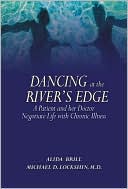

 |

|

The average rating for Dancing at the River's Edge: A Patient and Her Doctor Negotiate Life with Chronic Illness based on 2 reviews is 4.5 stars.
Review # 1 was written on 2009-02-14 00:00:00 Bernard Guinta Bernard Guinta'Visiting and inhabiting the world of chronic illness are two very different things.' This book has a particular resonance for me: my autoimmune disease is causing eye related problems and I am currently legally blind in my left eye. From 6/6 to 6/60 in three months is a big jump. And so, I have a particular interest in chronic illness especially those with an autoimmune component. I read this book during a day, have dipped into and out of it since and will continue to do so. I am simultaneously enlightened, inspired and saddened. We are all touched by chronic illness, each in our different ways. Some of us feel it, some of us observe it, some of us care for people fighting with or suffering from it, many of us know or work alongside sufferers, while others try to provide answers. And sometimes, one person can fill a number of these roles. Chronic illness is an umbrella label for a number of different diseases and disorders that turn our individual bodies and minds into enemies rather than friends. Sometimes, the signs are obvious but often they are not. Chronic illness is often compartmentalized into neat medical chunks which may make treatment 'easier' for medical practitioners but often does little for patients who see themselves as progressively depersonalised through this segmentation. I applaud Ms Brill and Dr Lockshin for sharing their experiences with readers. Medicine cannot provide all of the answers and may not, yet, have identified all of the questions. Doctors and patients dance an intricate pavane but often with differing steps because of different senses of time. I think the hardest thing about chronic illness is knowing, and then accepting, that containment rather than the cure is the most likely positive outcome at the individual level in real time. In bringing their shared experiences and unique perspectives together in this book, Ms Brill and Dr Lockshin invite us to read, absorb and reflect. I thank them for taking the risk of inviting strangers into their thoughts and experiences. This book does not contain easy answers but it does enable you to see some of the milestones on the journey and, perhaps, to read time better than I can. I would recommend this book unreservedly to those of us living with chronic illness, and for all of those involved in caring for or about people. I think that includes most of us. |
Review # 2 was written on 2016-10-26 00:00:00 O. Sessoms O. SessomsPatient Alida Brill and her physician Michael Lockshin, MD collaborated on the creation of this book. It's divided into sections written by each of them, with more from Alida than Dr. Lockshin. Alida Brill has lived with chronic illness since her teens. And in her career she's fought for women's rights and for women's issues. She has lived a full and rewarding life, despite the incredible daily challenge of her illness. I highlighted countless passages from Alida as I read. She is eloquent and tremendously insightful about the world of chronic illness. Her connection of the desire for love and support with feminism and the male ego is nothing short of brilliant. She writes, "Chronic illness in a female partner gnaws at a man's sense of control, his sense of power, his sense of being victorious against danger. Call it what you will, and if you wish, go ahead and accuse me of being politically incorrect. Whatever you want to label my remarks, it remains the case that a chronically ill woman threatens a man's sense of himself, and calls into question his feelings of success as a man, a lover, a "white knight."" I also appreciated Alida's section on the tendency of patients with chronic illnesses to blame themselves for their illness. And why we shouldn't! The sections from Dr. Lockshin didn't connect as strongly for me, perhaps because I'm a patient rather than physician. I found him to be caring and knowledgeable, but certainly not transcendent like Alida. Essentially, he's cultured and curmudgeonly older man with genuinely sincere intentions. Here's an example: "Powerful thing this, the training and license that grant me the ability to destroy or sustain another's dream. Sobering and frightening and nauseating thing this, the knowledge that I sometimes actually do exercise this power. Humbling thing this, to be able to use this power, once in a while, to salvage lethal mistakes, made seriatim, on a cheeky Puerto Rican kid with a tattoo." I've read many books about living with chronic illness. I'm sure this will remain one of my favorites for a long time! Thanks to NetGalley, Schaffner Press, and the authors for the opportunity to read a free digital copy in exchange for an honest review. |
CAN'T FIND WHAT YOU'RE LOOKING FOR? CLICK HERE!!!